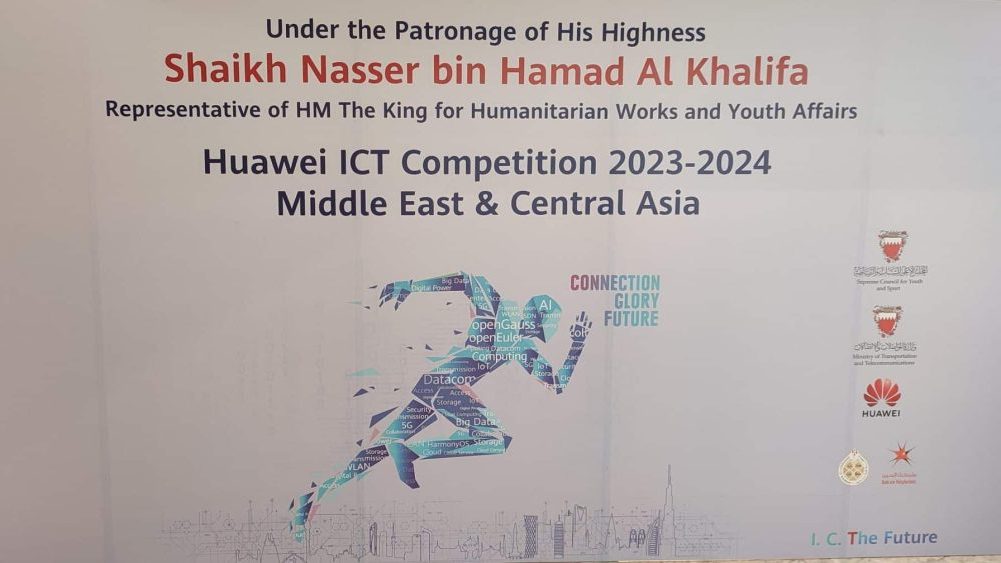Huawei’s ICT Competition’s Regional Finals 2023-24 concluded on Thursday, 21st December 2023 at the University of Bahrain. The closing ceremony hosted several distinguished guests including Mr. Steven Yi, President of Huawei Middle East and Central Asia, Shaikh Nasser Bin Hamad Al Khalifa, representative of The King for Humanitarian Works and Youth Affairs, Bahrain’s Minister of Education Mohammad bin Mubarak Juma, and Denis Kapelyushnik, representative of the UNESCO Institute for Information Technology and Education.
Mr. Steven Yi addressed the attendees at the event, thanking the Bahrain government, the University of Bahrain, and Bahrain Polytechnic for hosting the event. Huawei has made significant contributions to Bahrain’s ICT sector by collaborating with the government to advance digital transformation through 5G deployments, national broadband developments, and the training of over 2000 ICT professionals. He highlighted how Bhag Chand from Tharparkar, Pakistan managed to advance to the finals of the ICT Competition in 2021, eventually taking home the prize. Bhag went on to become the ICT Competition Ambassador at Huawei. In this year’s competition, he highlighted that more than 27,500 students from 21 countries, hailing from over 600 universities participated, with 22 teams from 11 countries reaching the regional finals.
Shaikh Nasser Bin Hamad Al Khalifa remarked,
I wanted three years ago to create opportunities to upgrade and upskill participants through high-intensity, gamified interactions. In essence, what I was looking for was high intensity, high-impact impact competitive game fire boot camp that teaches new skills and objectively tests capabilities to prepare one for future challenges and opportunities for this initiative.
He added that Bahrain has been looking to upskill the youth with competitive gamified bootcamps to prepare them for future opportunities, and Huawei was the first to respond to his initiative. He added that this resulted in excellent collaboration between the private and public sectors to improve the youth. He congratulated the students for participating in the competition. “We live in exciting times, be ready to collaborate to compete and win,” added Shaikh Nasser.
Pakistan’s network team 2 won the grand prize, alongside the Qatar cloud team and the Kazakhastan computing team.
The grand prize-winning team’s students Muhammad Bilal Gul and Muhammad Usman also discussed how they came through in the competition versus other teams:
The qualification process was a long road for us as we had to compete with over 14,000 students from around Pakistan. We prepared quite a bit for the preliminary exam. The national finals which was more difficult as it has multiple stages that you have to complete in succession. Once we passed the national finals we reached the top 30 in Pakistan. During the interviews of the top 30 it was a do or die situation for us as they could only select 6 students with the others getting eliminated. That was a very challenging point and we weren’t sure if we would make it through to the global finals which is our dream. For Bahrain’s competition the most challenging thing for us was the lab exam as the theoretical exam consists of MCQs and is easier. The lab exam was much more difficult than anticipated. The other teams were also surprised by the tasks in the lab exam. After the initial shock we calmed ourselves down, made a strategy and implemented it. It worked, allowing us to take the grand prize. We’re thankful to Allah almighty and our team that pulled through in this unexpected situation with topics that we hadn’t practiced for at all. For the global finals we’ll go through the coursework. We noticed our shortcomings that we could improve on and work with an even better strategy for the global finals. We’re preparing to win the global finals.
The first prize was claimed by Bahrain’s computing team, Kazakhstan’s cloud team, and Lebanon’s network team.
Jordan and Iraq’s computing teams won the 2nd prize, Pakistan and Lebanon’s cloud teams won the 2nd prize, with Bahrain and Iraq’s network teams taking home the 2nd prize.
The Pakistani team that won the 2nd prize included Onkar, Zeeshan, Saagar, and Asfandyar Jamali, with three of them hailing from NUST, enrolled in CS and Engineering programs. Talking about how they got selected they said:
Huawei held a seminar at NUST which is how we found out about the ICT Competition. After the preliminary exam and the national finals we got selected after the interview. We competed against the other teams in the cloud track and got the 2nd position. It was quite tough with two tests back to back. The first was an hour long MCQ test followed by a 4-hour lab exam. The written test went well with the lab exam going well too but Kazakhastan and Qatar putting up a good fight. The competition was tough but 2nd position is good enough. We hope to do better during the global finals in Shanghai next year.
Pakistan team’s Instructor Faheem from Mehran University played a key role in motivating and encouraging his students, enabling them to win the competition. He said,
Our country’s education system is lacking in terms of quality. The students only get the necessary IT and technological exposure when they join universities versus other countries where students start gaining exposure early on in schools. This means our students have to work much more than international students to reach the same level. Mehran University has a history of winning this competition, with Bhag Chand being a prominent example for other students. Next year InshaAllah we’ll keep the momentum going and make up for our mistakes and wherever we’re lacking.
Talking about the difficulties the team faced in the competition, he added,
Middle east’s network exam was tough with the global competition’s exam being even tougher. The team will need to improve further to win, they felt they were lacking as they couldn’t answer all the questions in time. The marking is also relative, which means the team with a better score than others will win even if they don’t have high marks overall. The global competition will include the best talent from around the world which means the team will need to do more, and with Pakistan being from a backward area we’ll need to work very hard. Let’s hope we make our country proud.
The third prize was won by Saudi Arabia, Oman, and Lebanon’s computing teams, Iraq and Saudi Arabia’s cloud teams, and Jordan, UAE, Saudi Arabia, and Kuwait’s network teams.
In addition to the main winners, Bahrain Network (Bnet) and Saudi Telecom (STC) were given an Excellent Partner in Talent Development award.



























